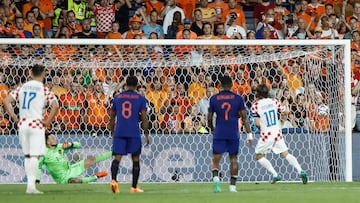UEFA NATIONS LEAGUE
What happens in case of a tie in the UEFA Nations League final? Extra time, penalty kicks…
Croatia face Spain in the Nations League final in Rotterdam. Both teams have had their share of knockout round ties in recent years.

The third edition of the UEFA Nations League will come to an end on Sunday in Rotterdam in the Netherlands, with either Croatia or Spain set to join the Dutch and France in lifting Europe’s newest international trophy.
Luka Modric and his mates continue to amaze us all at the very elite level of international soccer, with Croatia, who have a population of under four million, having reached a World Cup semi-final, a World Cup final and now a Nations League final in the last five years. Zlatko Dalic’s team recovered from the concession of an injury-time equaliser to defeat hosts the Netherlands in the semi-finals, with Modric sealing a 4-2 victory with a penalty in extra time.
- Croatia vs Spain: Follow the live action here!
Spain, by contrast, have rather flattered to deceive for more than a decade. Having won three tournaments in a row between 2008 and 2012, they haven’t got past the round of 16 of a World Cup since then, although they did reach the semi-finals of Euro 2020 and the were runners-up to France in the 2021 Nations League Finals. Can they go one better this time around after narrowly edging out Italy in the semis?
Croatia: extra-time and penalty masters
That Croatia’s last-four clash against the Netherlands was settled in extra time (overtime) will have come as a surprise to absolutely nobody. In the 2018 World Cup, three of their four knockout matches went to extra time, with their quarter-final against Russia decided on penalties.
Four years later in Qatar, the pattern continued, with knockout games with Japan and Brazil both ending in ties, Croatia prevailing after extra time and penalties. And, sandwiched in between, they were beaten in the additional period by Sunday’s opponents Spain in the round of 16 in Euro 2020.
All in all, eight of Croatia’s last nine knockout matches have gone to extra time, with four of them being decided in their favour by a penalty shootout.
Spain: penalty disasters
And, incredibly enough, pretty much the same thing has been going on over on the other side of the fence in recent years. Spain’s last five World Cup and European Championship matches have all gone to extra-time, and four to penalty shootouts. Unlike Croatia, however, La Roja have proved rather less adept from the spot, being eliminated from the 2018 World Cup, Euro 2020 and the 2022 World Cup by Russia, Italy and Morocco respectively.
If that’s not enough to convince you that the game in Rotterdam will end in a tie, which has yet to happen in a UEFA Nations League final, then I don’t know what will.
Is there extra time and penalties in the UEFA Nations League final?
Unlike the third-place playoff, which goes straight to a penalty shootout if the teams are tied after 90 minutes, extra time is played in an attempt to find a winner. If that still isn’t enough, then it’s time for a nail-biting penalty shootout.
How does extra-time work in the UEFA Nations League final?
If Sunday’s final ends level with both teams tied after the full 90 minutes plus whatever stoppage time is added on, two 15-minute periods of extra time will be played with a brief, half-time interval between each half. If one of the teams scores more goals than the other during the 30 minutes of extra time, they will be declared the winners.
What happens if the final is still tied after extra-time? What is the penalty shootout procedure?
If the score is still level after extra-time, the winner will be determined via a penalty shootout, in accordance with IFAB Laws of the Game.
Both teams will take a minimum of five penalties each in a best-of-five series. The referee will toss a coin to determine the goal where the kicks will be taken. A second toss of the coin will decide which team takes the first kick and who will go second.
Each manager is responsible for selecting the first five players who will take the kicks and the order in which they take them. The penalty taker and both goalkeepers are the only ones allowed to remain near the goal area, all other players must remain in the centre circle or behind the halfway line.
The penalties are taken alternately by each time until both have taken five kicks - or until it is no longer possible for one of the teams to win the best of five series (eg. if one team converts their first three penalties and the other misses their three, the shoot-out is technically over).






